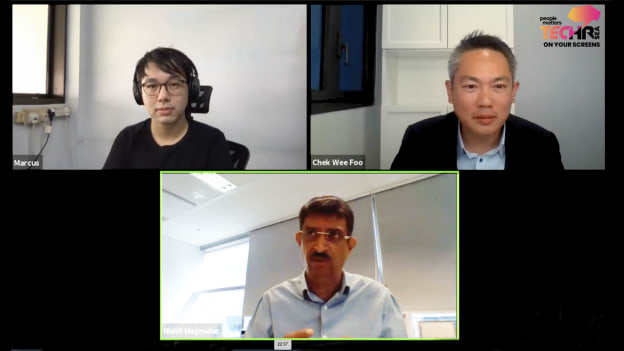CEO Powerpanel: What does the business expect from the HR function?

Agility is a top of mind business priority for businesses today. Business leaders need to work together with their HR counterparts to align their business realities. At TechHR SEA 2021, a panel of CEOs spoke about how business expectations and workplace priorities have changed – and how HR has to respond to these changes.
The session on “CEO PowerPanel: What does the business expect from the HR function?” was moderated by Chek Wee Foo, Head of Human Capital & Office Administration at The Straits Trading Company and featured Nishit Majmudar CEO at Aviva and Marcus Tan, Co-Founder at Carousell. Here are some of the highlights of the discussion:
To be able to be up and running quickly during the pandemic showed that companies can be agile, Nishit said.
The business expectation on agility
- Empathy: As a company that operates in eight different markets in the region, Marcus noted that “being empathetic to employee’s challenges was necessary because the nuances were different in different geographies.” In Myanmar, for example, the political environment had a direct impact on the access to internet service.
- Engagement and Communication: A number of companies have explored using the technology to engage their employees – right from providing wellness related sessions and supporting employees with the right infrastructure to enable them to work from home. Apart from health and safety, a number of companies have also invested in supporting their employees financially. At Carousell, the company invested in yoga sessions online as well as giving employees tips on personal finance etc., as part of their drive to engage with the employees. The focus must be on getting creative with engaging your employees.
- Accountable leadership: “HR needs to hold leaders accountable if there are blind spots and if they’re moving too fast at a time like this.” Marcus said. As the custodian of the employee’s voice there is a need for HR to take an active role in ensuring that there is an alignment with the leadership. Many companies have instituted forums and town halls online to ensure that there is a direct channel of communication with the leadership in the company. And such measures are likely to increase the trust in the steps that companies are taking.
- Simplify your strategy: A crisis is a great opportunity to relook at the business and simplify your strategy in a way that it energizes the company. Nishit Majumdar noted that among the things that HR should play an active role in the business is to ensure that the strategy is communicated in a compelling way. And to truly work as partners with the business, there’s a need to work with the end in mind – and invest time to understand the business goals amid new challenges in the workplace.
While answering audience questions, the speakers noted that building too many expectations from HR will note scale, and so the focus should be on the influence and quality of the initaitves. And company don’t always get things right. There’s a need to continuously experiment to see what works in a changing scenario.















